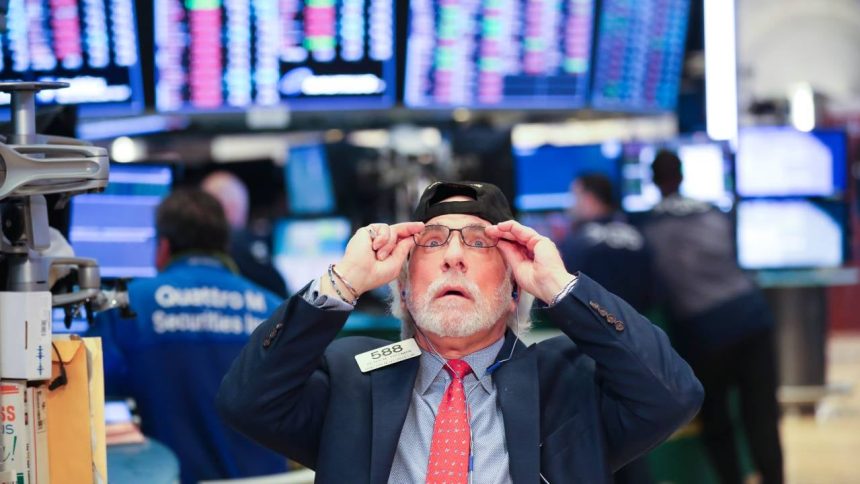The announcement of global tariffs by U.S. President Donald Trump sent the world’s stock markets into a tailspin, causing one of the worst multi-day downturns in history. While the selloff may make sense given the negative effects of Trump’s tariffs, investors should be cautious about selling their investments in a panic, lest they end up derailing their long-term wealth.
“While investors are no stranger to sharp downside volatility — 2020 and 2022 both produced bear markets — the speed of the decline since Thursday morning is unique, and is particularly unsettling,” says Greg McBride, CFA, Bankrate chief financial analyst. But, says McBride, “Investors should resist the urge for the knee-jerk reaction of selling,”
Here’s why you should avoid panic selling when the markets fall and how to win at investing.
3 reasons to not panic sell your stocks
1. The market’s best days often follow its worst days
One reason to avoid panic selling amid market volatility is that the stock market’s best days often follow its worst days. More generally, some of the market’s best days occur during a bear market, after stocks have been hammered and they look like a much more attractive value. It’s a key reason that good financial advisors try to keep investors in the market during a downturn.
For example, take the 2020 downturn due to COVID, which saw some of the market’s worst days of all time. March 12, 2020, was one of the worst days ever for the S&P 500 index, which lost 9.5 percent. Literally the next day, the market rose 9.3 percent — one of its best days ever.
And it’s the same situation in other bear markets. The list of the market’s top days is littered with those from the 1930s — in the midst of the Great Depression. Research from Hartford Funds shows that 50 percent of the market’s best days from 1995-2024 occur during a bear market. A further 28 percent occur during the first two months of a bull market, as the market turns, while just 22 percent of the stock market’s best days take place during the rest of a bull market.
Sell in a panic and you could be selling right at the bottom of the market.
2. You can lock in a huge tax bill
If you decide to sell a winning stock or fund, you’ll guarantee that you’ll pay taxes on your capital gain. Because you’ll owe taxes on your gain, you’ll be sure to have less money than before.
For example, imagine you own 100 shares of Stock XYZ that you purchased for $40, and the stock now sits at $70. You have a $3,000 capital gain. If you sell the stock, you’ll lock in that gain and a nice tax bill at the same time. If you pay tax at the long-term capital gains rate of 20 percent, you’ll owe $600 on that gain. So you’ll realize a net price on the stock after taxes of just $64. If the stock doesn’t go any lower than $64, you’ll end up being better off not having sold. Of course, the situation is more drastic if you’re paying tax at higher short-term capital gains rates.
While it can make sense to take a loss on a losing stock — a process called tax-loss harvesting — you’ll still want to consider whether it makes sense to own the stock for the long term.
So if you panic sell a winning stock, you guarantee that you’ll generate a tax bill, and you may be worse off than if you hadn’t sold at all. And if you sell, you’ll interrupt your ability to compound money, which could derail your long-term wealth-building plan.
Need an advisor to help you stay on track?
Looking for expert guidance when it comes to managing your investments or planning for retirement? Bankrate’s AdvisorMatch can connect you to a CFP® professional to help you achieve your financial goals.
3. The market can turn back up before you’re aware
If you’re out of the market because you’ve sold your investment, you’re almost guaranteed to miss the upswing when the market rebounds. And that means you could miss a huge run in stocks while they still look risky but are really offering great value for long-term investors.
That’s the case with investors who sold in early 2020, when the COVID pandemic hit. Stocks plunged in February and March that year. But after March they didn’t go any lower, putting in a bottom as the Federal Reserve announced that it was dropping interest rates to 0 percent to stimulate the economy. If you sold during the panic, you sold at the bottom and had to buy in at higher prices later in the year, as the stock market went on a massive run through the year 2021.
It may be a similar situation with today’s tariff news, which may end up being reversed or at least be fully priced in by investors, and then the panic selling goes away. Investors are always looking ahead and will push stock prices up before the clouds clear. As one piece of wisdom from investing legend Warren Buffett says: “If you wait for the robins, spring will be over.”
So if you sell, you’re out of the game and have to find a time to buy back in again. Often, that time ends up being after stocks have already risen and look “safe” but are more expensive.
How to use volatile markets to your advantage
It can be tough staying focused on the long term when your stocks are plummeting as they have following the news about Trump’s tariffs. But if you can stay focused, you can turn what appears to be a risky situation into one that sets you up for strong gains for years to come.
Investors who don’t need access to their money now have the ability to take a longer-term perspective on the market and should consider staying invested. That’s not to say that stocks won’t fall further, because they very well could. Rather, a decline in the market helps set up better future returns because you’re able to buy at a relatively low price.
So this approach requires a shift in mindset. For a long-term investor, a decline in the market is not something to necessarily actively avoid. Instead, it becomes an opportunity to continue holding and add more to investments that have fallen. The risk of a decline is transformed into an opportunity to buy more at a relative discount. The short-term trader doesn’t have this luxury, however, and this short-term mindset means the trader is always trying to avoid a downturn.
To turn to Buffett again, the Oracle of Omaha has long advised investors to buy an S&P 500 index fund and says: “Keep buying it through thick and thin, and especially through thin.”
To make smart money moves during the market’s volatility, it can also be valuable to work with a good financial advisor who has seen it all before and can keep you on the path to wealth.
Bottom line
Investors should be extra careful if they’re considering selling in a volatile market because it risks derailing their wealth over time. Instead, it can be helpful to “flip the script” and buy when markets are lower because they’re offering better values then. Suddenly, investors can transform a downturn not into a risk to be avoided but an opportunity to profit when stocks rise again.
Editorial Disclaimer: All investors are advised to conduct their own independent research into investment strategies before making an investment decision. In addition, investors are advised that past investment product performance is no guarantee of future price appreciation.
Read the full article here














